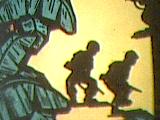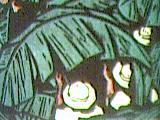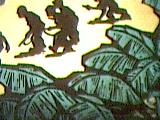
-- post mental --

-- post mental --
from The Snap Revolution (Granta 18)
Years before his pieces on events and scenes around the
1986 EDSA revolution were to be
scrutinized for his masterful use of shifting diction and imagery in
journalism, James Fenton's
Granta Special was disparaged for its tendency to be romantic and
given to sentimentalism. Below is an
excerpt from the work describing the aftermath of the
revolution.
Back to Malacaņang
Well, I thought, if I've missed it all, I've missed it. That's that.
I turned back and walked down the center of the road to Malacaņang, my feet crunching broken glass and stones. I asked a policeman whether he thought it safe to proceed. Yes, he said, there were a few Marcos men hiding in the side-streets, but the fighting had all stopped. A child came running past me and called out, 'Hey Joe, what's the problm?' but didn't wait for an answer.
As I came within view of the palace I saw that people were climbing over the railings, and just as I caught up with them a gate flew open. Everyone was pouring in and making straight for the old Budget Office. It suddenly occurred to me that very few of them knew where the palace itself was. Documents were flying out of the office and the crowd was making whoopee. I began to run.
One
of the columnists had written a couple of days before that he
had once asked his grandmother about the Revolution of 1896.
What had it been like? She had replied: 'A lot of running.' So
in his family they had always referred to those days as
 the Time of Running. It seemed only appropriate that, for the
second time that day, I should be running through Imelda's old
vegetable patch. The turf looked sorrier than ever. We ran over
the polystyrene boxes which had once contained chicken dinners,
past the sculpture garden, past where people were jumping up and
down on the armoured cars, and up onto the platform from where
we had watched Marcos on the balcony. Everyone stamped on the
planks and I was amazed the whole structure didn't collapse.
the Time of Running. It seemed only appropriate that, for the
second time that day, I should be running through Imelda's old
vegetable patch. The turf looked sorrier than ever. We ran over
the polystyrene boxes which had once contained chicken dinners,
past the sculpture garden, past where people were jumping up and
down on the armoured cars, and up onto the platform from where
we had watched Marcos on the balcony. Everyone stamped on the
planks and I was amazed the whole structure didn't collapse.
We came to a side entrance and as we crowded in I felt a hand reach into my back pocket. I pulled the hand out and slapped it. The thief scurried away.
Bing was just behind me, looking seraphically happy, with his cameras bobbing round his neck. We pushed our way through to a kind of hall, where an armed civilian told us we could go no further. The journalists crowded round him, pleading to be allowed a look. The man had been sent by the rebel troops. He had given his word of honour, he said. He couldn't let anybody past. But it was all, I'm afraid, too exciting. One of the Filipino photographers just walked past the guard, then another followed, then Bing went past; and finally I was the only one left.
I thought, oh well, he hasn't shot them, he won't shoot me. I scuttled past him in that was people do when they expect to be kicked at the backside. 'Hey, man, stop,' said the guard, but as he followed me round the corner we both saw he had been standing in the wrong place: the people in the crowd had come round another way and were now going through boxes and packing-cases to see what they could find. There were no takers for the Evian water. But everything else was disappearing. I caught up with Bing, who was looking through the remains of a box of monogrammed towels. We realized they had Imelda's initials. There were a couple left. They were irresistible.
I couldn't believe I would be able to find the
actual  Marcos
apartments, and I knew there was no point in asking. We went up
some servant's stairs, at the foot of which I remember seeing an
open crate with two large green jade plates. They were so large
as to be vulgar. On the first floor a door opened and we
found ourselves in the great hall where the press conferences
had been held. This is the one bit of the palace the crowd would
recognize, as it had so often watched Marcos being televised
from here. People ran and sat on his throne and began giving
mock press-conferences, issuing orders in his deep voice,
falling about with laughter or just gaping at the splendour of
the room. It was all fully lit. Nobody had bothered, as they
left, to turn out the lights.
Marcos
apartments, and I knew there was no point in asking. We went up
some servant's stairs, at the foot of which I remember seeing an
open crate with two large green jade plates. They were so large
as to be vulgar. On the first floor a door opened and we
found ourselves in the great hall where the press conferences
had been held. This is the one bit of the palace the crowd would
recognize, as it had so often watched Marcos being televised
from here. People ran and sat on his throne and began giving
mock press-conferences, issuing orders in his deep voice,
falling about with laughter or just gaping at the splendour of
the room. It was all fully lit. Nobody had bothered, as they
left, to turn out the lights.
I remembered that the first time I had been here, the day
after the election, Imelda had slipped in and sat at the side.
She must have come from that direction. I went to investigate.
And
now, for a short while, I was away from the crowd with just one
other person, a shy absolutely thunderstruck Filipino. We had
found our way, we realized, into the Marcoses' private rooms.
There was a library, and my companion gazed in wonder at the
leather-bound volumes while I admired the collection of art
books all carefully catalogued and with their numbers on the
spines. This was the reference library for Imelda's world-wide
collection of treasures. She must have thumbed through them
thinking: I'd like one of them, or I've got a couple
of the in New York, or That's in our London house.
And then there was the Blue Drawing Room with its twin portraits
of the Marcoses, where I simply remember standing with my
companion and saying, 'It's beautiful, isn't it?' It wasn't that
it was beautiful. It looked as if it had been purchased at Harrods. It was just that,
after all the crowds and the riots, we had landed up in this
peaceful, luxurious den. My companion had never seen anything
like it. He didn't take anything. He hardly dared touch the
furnishings and trinkets. We both simply could not believe that
we were there and the Marcoses weren't.
looked as if it had been purchased at Harrods. It was just that,
after all the crowds and the riots, we had landed up in this
peaceful, luxurious den. My companion had never seen anything
like it. He didn't take anything. He hardly dared touch the
furnishings and trinkets. We both simply could not believe that
we were there and the Marcoses weren't.
I wish I could remember it all better. For instance, it seemed to me that in every room I saw, practically on every available surface, there was a signed photograph of Nancy Reagan. But this can hardly be literally true. It just felt as if there was a lot of Nancy in evidence.
Another of the rooms had a grand piano. I sat down.
'Can you play?' said my companion.
'A little,' I exaggerated. I can play Bach's Prelude in C, and this is what I Proceeded to do, but my companion had obviously hoped for something more racy. Beside the piano stood a framed photograph of Pham Van Dong, and beside the photograph lay a letter. It was a petition from members of a village, asking for property rights to the land they lived on. It as dated well before the Snap Election. Someone (Marcos himself? The letter was addressed to him) must have opened it, seen it was a petition, popped it back in the envelope and sat down to play a tune. The keys were stiff. I wondered if the piano was brand new.
A soldier came in, carrying a rifle. 'Please co-operate,' he said. The soldier looked just as overawed by the place as we were. We co-operated.
When I returned down the service stairs, I noticed that the green jade plates had gone, but there was still some Evian water to be had. I was very thirsty, as it happened. But the revolution had asked me to co-operate. So I did.
 Outside,
the awe had communicated itself to several members of the crowd.
They stood by the fountain looking down at the coloured lights
beneath the water, not saying anything. I went t the parapet and
looked across the river. I thought: somebody's still fighting;
there are still some loyal troops. Then I thought: that's crazy
-- they can't have started fighting now. I realized that I was
back in Saigon yet again. There indeed had been fighting
on the other side of the river. But here it was fireworks. The
whole city was celebrating.
Outside,
the awe had communicated itself to several members of the crowd.
They stood by the fountain looking down at the coloured lights
beneath the water, not saying anything. I went t the parapet and
looked across the river. I thought: somebody's still fighting;
there are still some loyal troops. Then I thought: that's crazy
-- they can't have started fighting now. I realized that I was
back in Saigon yet again. There indeed had been fighting
on the other side of the river. But here it was fireworks. The
whole city was celebrating.
Bing emerged from the palace. We decided we must see the crowd coming over the Mendiola Bridge. The experience would not be complete without that. And besides we were both hungry. Somewhere must still be open.
We had grown used to the sites of millions of people on the streets, but there was something wonderful about this crown, noisy but not mad, pouring across the forbidden bridge. Imelda's soothsayer had got it slightly wrong. He should have said: When the crowds pour over the Mendiola Bridge that will mean the regime has alredy fallen, that it is not about to fall. Still, the error was minor. The man had been right in broad outline. Many members of the crowd were wearing crowns of barbed wire. Bing snapped out of his dream. 'And now,' he said, 'now they will begin to crack down on the Communists. Now there will be a real crackdown.''
We went down a dark, quiet street in the university area, found some food and started chatting to others who had been at the palace. They had taken boxes and boxes of ammunition. We sat out on the pavement. I said to one guy: 'Congratulations. You've just had a real bourgeois revolution. They don't happen very often nowadays. You should be pleased.'
He said, 'f it's bourgeois revolution, it's supposed
to bring in socialism.'
I said: 'You read Marx?'
He said: 'No! I read Lenin!' Then he laughed, and said he was only joking. But i didn't think he was joking, actually. He said: 'Cory's a rich woman and a landowner. These people aren't the good guys/ You come back for the next revolution. The next revolution, it'll be the NPA. The next revolution it'll be the Reds!'
Bing took me to find a taxi, and we said goodbye/ He couldn't resist it: he had to go back to the palace. The taxi=man had a linguistic habit I had never come across before. He could survive without any personal pronouns except I, me and my. 'Well James,' he said, as I got in, 'have I been to Malacaņang?'
I thought for a moment.
'Have I been to Malacaņang, James?' he repeated.
'Yes,' I said. 'I have been to Malacaņang.'
'Has Marcos gone?'
Yes, this time he really had gone.
'Marcos is a good Man, James,' said the taxi-man, 'but my wife is very bad. Yes James. Marcos is a good man. But my wife is very ba.'
'Yes,' I said, finally understanding the rules, 'my wife is very bad indeed.'
 (James Fenton was born in Lincoln,
England. He also covered the fall of Saigon and is proud to claim
that he was one among he first to loot the American Embassy
after the fall of Saigon. For another perspective on the 1986
EDSA revolution, visit Walang Himala! Himagsikan sa EDSA. )
(James Fenton was born in Lincoln,
England. He also covered the fall of Saigon and is proud to claim
that he was one among he first to loot the American Embassy
after the fall of Saigon. For another perspective on the 1986
EDSA revolution, visit Walang Himala! Himagsikan sa EDSA. )